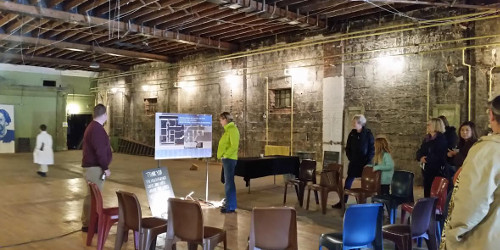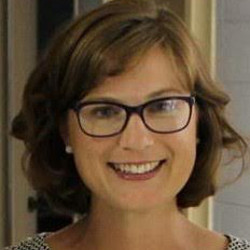
Church members on the First Presbyterian Church of Birmingham's "Mission Crawl" in October 2015 to learn more about plans for the Ruth Ellis Health and Wellness Center. Inset: A Vision Statement quilt hangs in the Welcome Center at First Presbyterian Church in Birmingham. Photos courtesy of FPC
Up to 40 percent of all runaway and homeless youth nationwide identify as LGBTQ. Disproportionately affected, LGBTQ young people face a myriad of barriers, including family rejection based on religious beliefs, among others.
When Rev. Amy Morgan learned of this tragedy through her work with the Ruth Ellis Center in Highland Park, she said, "That kills us."
As the master of divinity and associate pastor for missions and community at the First Presbyterian Church in Birmingham, Morgan said, "That is not what Jesus would do. That's not in the book. This is so against the grain of what we believe the Christian gospel message is."
Which is why Mark Erwin-McCormick, REC director of development and advancement said, "It's so incredibly important for the Ruth Ellis Center to continue having conversations with communities of faith, especially those that are affirming because they are needed as a resource when working with families. They need to know there are churches available to them that will affirm both them and their children."
Such as the FPC, known as "Everybody's Church," which has a long history of being involved in serving the community. FPC of Birmingham is one of seven Presbyterian churches in North Oakland County. The first was organized in Pontiac in 1824.
"We are building relationships with and getting members of the church involved in the work we're doing," said Erwin-McCormick drawing attention to the national implications when communities of faith become involved in this type of work. Especially now as the LGBTQ community faces religious exemptions and further stigma under this new administration.
Morgan explained how the partnership between FPC and the REC developed a little over two years ago following a tour of the Center.
"People were blown away … A handful of church leaders discern what our projects will be. We discuss how we can make the largest impact … We surveyed the congregation and learned where people's passions were. LGBTQ support and the Ruth Ellis Center were a natural go-to."
The First Foundation made it possible to offer $56,000 to the REC, the largest contribution made to the Center from the faith community. Of that money, $36,000 was allotted to the Health and Wellness Center, for which the Center hopes to complete its Capital Campaign in 2017 with community support. The other $20,000 went toward the Family Preservation Program.
The foundation, introduced in 1981, was established to continue and extend the work and ministry of the FPC by receiving and administering gifts and bequests, and by undertaking to secure increases of the assets of the foundation. The foundation is overseen by a board of nine members and is appointed by the session for six-year terms. This board evaluates grant requests and oversees the investment of the foundation funds.
"We don't do this because we're crazy hippy liberals that don't care what the Bible says," said Morgan. "We care deeply what the Bible says, which is why we feel we have to do this."
The congregation has funded a trip to Cedar Point for residents of Ruth's House (the REC's residential foster care facility), and provided the Center with new appliances when needed. On the first Monday of each month, members of FPC provide meal service at the REC drop-in center.
"I watch them as they dance and express themselves. I see their souls coming out. This is who they are. Their movement, their interaction with each other is something the world should see. What a wonderful group of young people. It makes me smile," said Sue Bay, who is on the FPC board of deacons and functions as the deacons representative to the REC. Bay also serves on the congregation's Diversity, Inclusion, and Justice Committee.
"They deserve to be happy, these youth, like anybody else. If there's anything at all we can do, it's to let them know that we care. We want to work with them in any way that we can," she said.
Deacons are members of the church elected by the congregation to serve on the board of deacons for terms of one to three years. Deacons reflect the church membership from high school students to long term members. The mission of the deacons is to reach out to those in need.
"We see ourselves as a congregation that wraps around young people that are on their own. The Ruth Ellis Center isn't just serving a meal or just offering counseling or wellness resources. It's all of it," said Morgan. "We are really concerned for the whole person, which is central to who Jesus was – a teacher and a healer. I want you to have abundant life and be whole. The Ruth Ellis Center is an organization that does that day in and day out. We have to be a part of that."
Morgan referred to a book called "They Like Jesus but Not the Church: Insights from Emerging Generations," about many young people who don't resonate with the church and organized Christianity today.
"We really need to get the message out that Christianity is inclusive and Christ is welcoming," she said. "Millennials believe the church is hypocritical and homophobic. Our church is none of those things, but nobody knows that. Those labels don't apply here."
 Amy Morgan, MDiv., Associate Pastor for Missions and Community at First Presbyterian Church in Birmingham.
Amy Morgan, MDiv., Associate Pastor for Missions and Community at First Presbyterian Church in Birmingham.And while the REC does not facilitate religious-based services, and does not promote one religion over another, having resources in the space for youth to pursue spirituality, religion, and faith on their own terms is part of holistic service planning.
Some of these young people might not see a connection right now and how significant it is – that there are people from local congregations to support them just as they are – down the road they might connect with that and it might mean something to them.
"That's why I want to be here. They are children of God," said Rosy Latimore, an elder in the church who chairs the DIJ committee. "We don't have all the answers, but we get so much enjoyment out of working with them."
When meeting LGBTQ youth at the REC, she said, "It breaks my heart," to know the challenges these young people are facing on a daily basis.
"The fact that a young person who identifies as LGBTQ is experiencing homelessness because of it – that just really affected me," said Tom Kirchhofer, who serves on the DIJ committee, and is also a deacon, though not currently on the board. "I couldn't walk out of the REC without a burden. I wanted to and will continue to do something to work with the youth."
A Mid-winter Choral Concert
The Cathedral Music Society presents the Cathedral Choirs in a concert to benefit the Ruth Ellis Center on Feb. 24 at 7:30 p.m. A reception, sponsored by the First Presbyterian Church of Birmingham and the Metropolitan Community Church of Detroit, will follow the choir concert. A great breadth of choral music will be presented from early music to spirituals. The event hosted by the Cathedral Church of St. Paul takes place at 4800 Woodward Ave. in Detroit. Ample, well-lit parking is available by entering via Cathedral Lane from eastbound Warren Avenue. Fore more information, please call 313-833-7547 or email [email protected].










